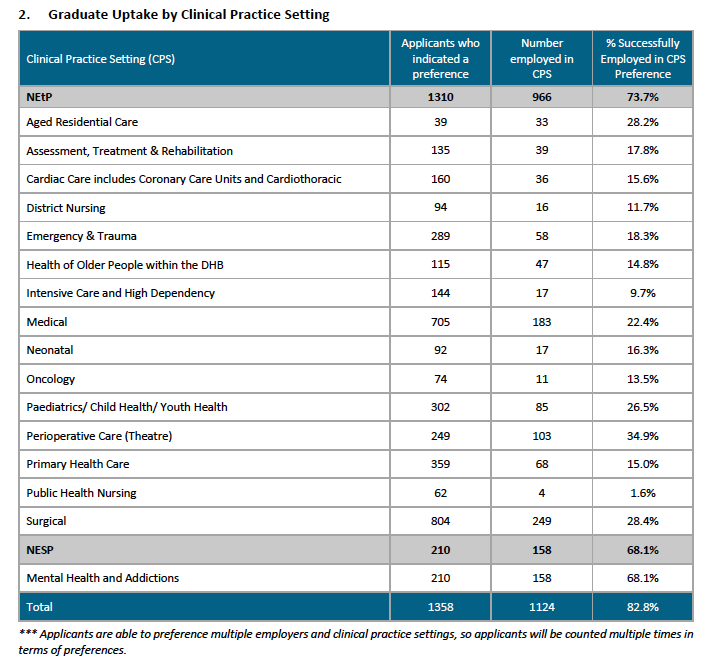Public health, district and primary health nursing were three of the clinical practice setting with the odds most stacked against new graduate nurses winning a place, according to the latest job statistics.
The ACE summary report released this month showed that a record 83 per cent (1,124) of the 1,357 graduates who applied in the end of 2017 ACE intake had gained nurse entry to practice (NETP) or nurse entry to specialist practice (NESP) positions by the time the intake closed in late June. Up on 71 per cent at the same last year.
A further 4.2 per cent of applicants had declined offers, failed State Exam or withdrawn leaving 176 applicants (13 per cent) of the original applicants still in the National Talent Pool on June 29 – about half the number at the same time last year.
Applicants seeking new graduate jobs through ACE can choose three preferred clinical practice settings. The 210 applicants who put mental health as a preference were the most likely to get their preference with 68 per cent gaining one of the 158 NESP places.
Just under half of the 1,309 applicants successfully gained a NETP job in one of their three preference settings through the initial electronic match in November but this rose to nearly three-quarters by the time the talent pool closed.
Community jobs some of the toughest to get
For individual NETP settings, some of toughest competition for limited jobs was in community and primary health nursing roles.
Particularly in public health nursing with 62 new nurses expressing a preference but only 1.6 per cent were successful in being one of the four employed. District nursing also had relatively high application rates compared with places with 11.7 per cent of the 94 applicants gaining one of the 16 places.
Primary health was the third most popular preference chosen by new graduates (after medical and surgical) with nearly 360 expressing a preference for primary health care roles – including practice and hospice nursing – with 15 per cent of them gaining one of the 68 jobs.
Just 39 applicants put aged residential care as a preference, but while the sector employed 33 nurses on NETP this year only 28 per cent of those who expressed a preference were employed in the sector and six people showing a preference to work in residential aged care remained in the talent pool in late June.
Intensive care toughest odds for hospital jobs
The traditional first job placements for medical or surgical wards continued to have the largest number of graduates seeking jobs, with 804 putting surgical as a preference and 705 putting medical.
This year surgical wards took on the most graduates, with 28.4 per cent gaining one of the 249 places and medical wards taking on 183 (22.4 per cent).
Perioperative/theatre was the clinical practice setting taking on the highest proportion of applicants, with nearly 35 per cent of the 249 expressing a preference gaining one of the 103 places.
Other popular settings were paediatrics/child health and youth health with 26.5 per cent of the 302 applicant getting a place in this setting and emergency where just 18.3 per cent of the 289 expressing a preference for starting their career in an ED getting a job.
But the toughest clinical practice setting to get a place in acute care was intensive care which took only less than 10 per cent of the 144 who expressed an interest. Also challenging were oncology, with a 13.5 per cent success rate for applicants, and neonatal with 16.3 per cent.
Source: ACE Nursing Summary Report – 2017 End of Year Graduate Intake






















